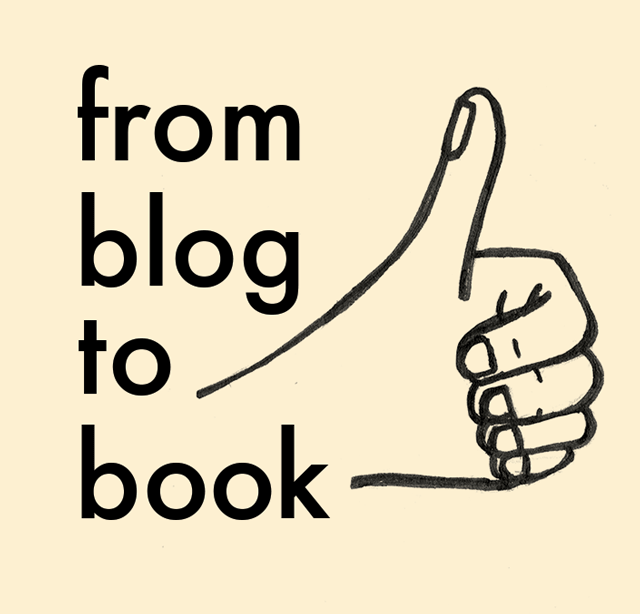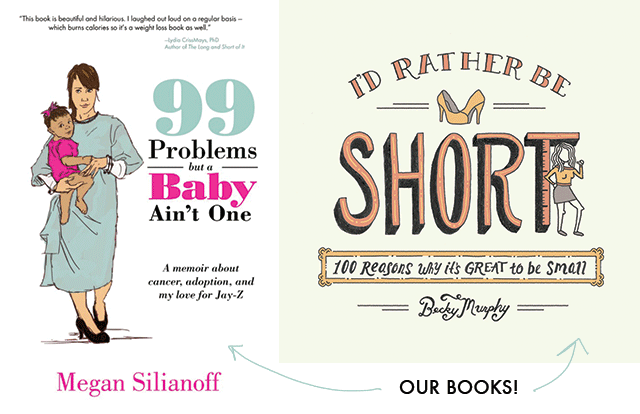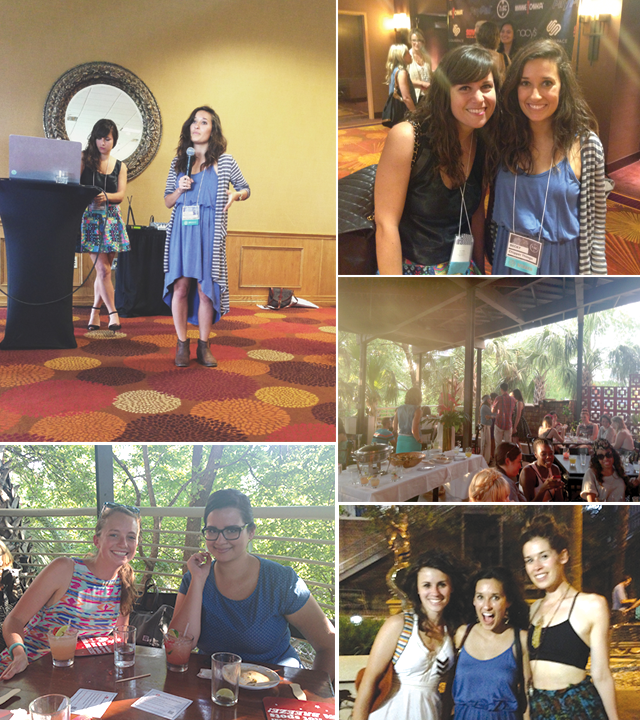I hope you all had a wonderful weekend! I had a great time in Seattle for my friends’ wedding on Saturday, then back in Austin for Texas Style Council‘s Summer School on Sunday. Megan (Greetings From Texas) and I had a hoot co-leading a workshop on turning our blogs into books. We mentioned our stories as well as heaps of resources we promised to provide. This post is for anyone at the conference who wants a list of what we mentioned, as well as anyone who wants to know how to navigate through this publishing process.
Today I’ll tell you who we are, what we’re publishing, and a few directions you can take for your forthcoming book. Tomorrow I’ll post the top 10 lessons we’ve learned from this journey.
1. Who we are
I wrote and illustrated I’d Rather Be Short. It’s 100 reasons why it’s great to be small. Published by Penguin/Plume Books and will be available where books are sold October 29—but you can preorder it today! ←see side bar. Please come to my book signing at Book People October 29 at 7 PM. My favorite thing about this adventure is meeting new people, so let’s make it happen!
My co-host was Megan Silianoff, also a former midwesterner turned Texan. Check out this cute post of her, Danny and Baby Macy on the Every Girl. Megan is the founder of the Houston Blogger Symposium and somehow has the time to do that, freelance, keep up her blog, write a book, then promote it. She’s superwoman! Her book, 99 Problems But A Baby Ain’t One, is a memoir about cancer, adoption and her love for Jay Z. She is hilarious and unbelievably inspiring. And her baby, Macy, is the cutest.
“Whoa. I can’t believe you have a kid!” —me
“I know. I’m just as surprised as everyone else.” —Megan
2. Your book
It should be noted that like snowflakes and stomach growls, every journey to publication is different. Don’t be discouraged if yours doesn’t look like either of ours. If you’re reading this post, you’re on the right track. Starting somewhere now is better than starting somewhere later. I hope some of these pointers give you a bit of direction. If you want to know more about my book’s origin story and how I got a book deal, you can read this post. If you want to know more about Megan’s, head over to greetingsfromtexas.com.
I highly recommend querying lit agents vs. submitting directly to publishers. I recommend it so much that I’m going to tell you right now to NOT submit to publishers. I used agentquery.com and skimmed over the 2012 Guide to Literary Agents (the back has an index, which lists specific genres of agents). These two resources give you the direction you need to write a proper query (a query is the sample you send to agents to reel them in, so they want to see the rest of your book proposal and hopefully represent you to publishers). If you get an agent to represent you, that’s great! It’s not easy to get one, so when you do, it means they really believe in your project and they’re willing to invest in you. This site is very thorough; they should have plenty of answers to your questions. My friend Chad showed it to me, and though it gave me all the information I needed to query, it was more than helpful to have him help me write the query. I also had my friend Beth, who is an editor, help look things over. I recommend having another writer or editor read over everything and help you draft a sharp query. Don’t over think it, but do make sure it’s polished and professional.
I submitted a cover letter, summary, bio and four or five sample drawings that represented the direction of the rest of the book. I did not submit my full 100 reasons list. Every agent will have specific requirements for submissions. Follow their rules. They get so many queries; you don’t want to get deleted because you refuse follow directions on your first interaction.
Generally fiction is the only kind of proposal you need to have finalized before submitting. I had all 100 reasons, but not all drawn. That was enough for me to tell them that I knew exactly what direction this was going, how it will look, and offer space for feedback before finishing the book. Luckily they let me run in the direction I intended.
When you get an agent, remember that they are your ally. My agent, Laurie Abkemeier, has been a saint and I’m so thankful for how much she’s helped me. NOTE: I don’t know of any agents that cost money. I’d be leery of someone trying to charge you. Laurie signed me without taking a dime. When Penguin paid my advance, that’s when Laurie got a cut. This is great because it gives everyone incentive to sell many books. Laurie has an app called Agent Obvious. It’s a helpful tool for those already in publishing, or looking to acquire an agent.
A note on advances. I don’t think I properly covered this during yesterday’s talk. The way it worked for me is that the agent picks up the author (no fee), then the publisher picks up the author (author gets advance). Now that the publisher is paying the author (split into thirds, in my case: upon signing the contract, turning in final manuscript and book release), the agents gets a percentage. The agent will always get a cut of what that author makes from that specific project, whether it gets turned into a movie or the book does so well they have to do reprints and the author starts making royalties (most authors don’t make royalties because they have to earn back the advance in the amount of the royalties, maybe 6-10%. It’s less common for them to sell that many books. It doesn’t mean they have to pay back their advance, or it’s a sour deal, it just means royalties=real good book sales.)
The more I learn about self-publishing, the more I’m intrigued. A lot of writers have no desire to work with a traditional publisher. Some make more money doing it themselves or their audience is best suited for this method. They can work faster and they don’t have to answer to anyone. My friend Josh Long has some incredible books he’s published himself. Part of his message, hence the title, is EXECUTE. It makes more sense for him to put his book into the world at his pace and on his terms. When you publish yourself, you make all the money (vs. small percentage from the publisher), but you (usually) don’t have the name recognition or access to the media on a massive scale to promote it. 50 Shades of Grey started out self-published, but Random House must have picked it up when it got popular. Megan went with Brown Books in Dallas, where she invested in the books, but gets to keep all of the earnings.
Michelle asked how we get our books into book stores. Since I have a traditional publisher, they have a special sales team already in place. They sell to book stores like Barnes & Noble and have a specialty sales team for places like Urban Outfitters, Anthropologie, boutiques, etc. If I meet someone who wants to carry my book in their store, I am SO HAPPY and I pass their information along to Penguin. It’s not my job to land the sales from book stores; it IS my job to get the people into the stores to buy the book. Knowing how many copies your book has sold is a bit tricky because book stores can return books to publishers for free, and then those books may get recirculated in order to avoid unnecessary reprints. I’ve heard it takes about six months (after pub date) to know how many copies it’s really sold. I could be wrong though, as I’ve never done this before. If you’re producing your own book, you’d be in charge of getting it into stores. I know places like BookPeople have a section for local authors. Megan talked about how one could hire a publicist and a team to help cary that load. It just depends on how you want to split your time.
3. Resources!
Self-publishing. I’ve never used these sites, but they have been recommended by friends:
reKiosk
Packgr (great for publishing blog content into newsletters, books, etc.)
Smashwords
Amazon, Independent Publishing
CreateSpace
On finding agents and drafting a query:
agentquery.com
2013 Guide to Literary Agents
*Megan noted that she looked in the back of the books she liked to see who represented the author. That’s a fantastic idea because authors almost always thank their agent and editor in the acknowledgements.
Writing classes/conferences:
Write with Spike (Spike Gillespie, Austin-based. I go to this on Tuesday nights)
New York Pitch Conference (Megan went to this and recommends)
BlogHer Writers (another one Megan recommends)
Other noteworthy links:
Derek Sivers: Keep Your Goals To Yourself, TED Talk (3 min)
Anne Lamott’s Bird By Bird, fantastic book on writing. Funny and inspiring.
Agent Obvious, my agent, Laurie’s app that offers insight into the publishing world.
How To Self-Publish A Bestseller: Publishing 3.0, I highly recommend this TechCrunch article by James Altucher.
I hope this was helpful. I’m sure I’ve missed things, or didn’t uncover some dirty secrets you want to know. Feel free to leave a comment (I always read them and respond) if there’s something you’d like to know, or something you’d like to correct that I’ve said. I’d love to know what resources you’ve used or heard of. I expect to add more when you let me know what this list is missing! Feel free to email me at beckycmurphy@gmail.com and I’ll supplement this post with whatever I missed. Be sure to check out Megan’s post on Greetingsfromtexas.com.
Special thanks to Langford Market for sponsoring our talk.





6 Comments
Thank you and Megan so very much for sharing all of this knowledge with us at the conference. I wish y’all much success and many, many sold copies!
Thanks so much, Diana! Didn’t we meet last year?? I didn’t get a chance to say hi yesterday. Thanks for coming to our session!
You and Meg did such a great job at the talk! Funny, light, informative – high fives are in order. Was really great to meet you, and hope to make it out to your book signing…are 6′ ladies even allowed? ;) (Seriously…a girl at the conference gave me a tall people club card. What the heck?! Is that a thing now? Do I need to be embarrassed about this? Can you write me a book called “It’s OK to be huge”?)
yay! so glad you were there, Kristen! I knew who you were before the conference and I was looking forward to meeting you. How we didn’t spend all night talking, I do not know.
I’ve thought about a book for the tallies…agent said I need to ride this one out before I think too far ahead on that one. I’m thinking about you guys though. If it makes you feel better, it was the jealousy I had that make me write the book in the first place.
Great info, thanks for sharing! I couldn’t make it to the Texas Style Council event, so sad. I’m marking my calendar for Oct 29th at BookPeople. Wishing you much success on your book!
Thanks Katie! I really hope to see you at BookPeople!
One Trackback
[…] our workshop, we chatted about how we turned our blogs into books. I wrote last Monday about tips and tricks on the journey to publication. Today I share with you the top 10 lessons we […]